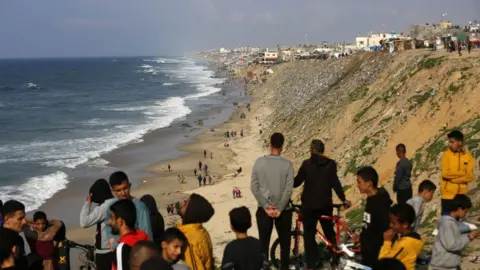US to set up temporary port on Gaza coast for aid delivery
 Getty Images
Getty ImagesThe US military will construct a port in Gaza to get more humanitarian aid into the territory by sea, President Joe Biden has announced.
The temporary port will increase the amount of humanitarian assistance to Palestinians by "hundreds of additional truckloads" per day, officials say.
Mr Biden added that no US troops would land in Gaza. The UK said it would work with the US to set up a sea corridor.
The UN warns that a quarter of the population is on the brink of famine.
The president made the official announcement during his State of the Union address on Thursday.
He said the port, which will be built by the US military, will involve a temporary pier to transport supplies from ships at sea to the shore.
It is not clear who will build the causeway or secure the aid on land, meaning crucial questions about whether the operation can succeed remain unanswered.
The port will take "a number of weeks" to set up, officials have said, and will be able to receive large ships carrying food, water, medicine and temporary shelters. Initial shipments will arrive via Cyprus, where Israeli security inspections will take place.
"A temporary pier will enable a massive increase in the amount of humanitarian assistance getting into Gaza every day," President Biden said.
He added that Israel must "do its part" by allowing more aid to enter into the territory and to "ensure that humanitarian workers aren't caught in the crossfire".
"Humanitarian assistance cannot be a secondary consideration or a bargaining chip."
On Friday, UK Foreign Secretary David Cameron posted on X: "Alongside the US, the UK and partners have announced we will open a maritime corridor to deliver aid directly to Gaza."
Israel's military launched an air and ground campaign in the territory after Hamas's attacks on Israel on 7 October, in which about 1,200 people were killed and 253 others were taken hostage.
More than 30,800 people have been killed in Gaza since then, the territory's Hamas-run health ministry says.
The conflict has created a growing humanitarian crisis. The World Health Organization (WHO) warned this week that children were dying of starvation in northern Gaza, where an estimated 300,000 Palestinians are living with little food or clean water.
Gaza has no deep water port and so the US has for weeks been looking at ways to get shiploads of aid in urgently, while the administration has publicly ramped up its pressure and increasingly shown in public its impatience with Israel over the desperate situation on the ground.
US officials told the BBC's US partner, CBS, that there are plans for the pier to be installed by an army unit called the 7th Transportation Brigade, based at Fort Story, Virginia.
The brigade is designed for rapid deployment, but the military ships have not yet left the US, the officials said.
Vice Adm Kevin Donegan, who was formerly Commander of the US Navy's Fifth Fleet - the most senior US naval commander in the Middle East - told BBC Radio 4's World Tonight programme that the port plan was "absolutely executable".
However, he said delivering aid by land was still the most effective way, in terms of being able to get as many goods in as possible.
Vice Adm Donegan also cautioned that having "security and a good distribution network" would be critical for the safe delivery of aid from the port, referencing the more than 100 people who were killed trying to reach an aid convoy. last week, amid the growing desperation.
Palestinians said most were shot by Israeli troops. The Israeli military, which was overseeing the private aid deliveries, said most were killed in a stampede.
Aid lorries have been entering the south of Gaza through the Egyptian-controlled Rafah crossing and the Israeli-controlled Kerem Shalom. But the north, which was the focus of the first phase of the Israeli ground offensive, has been largely cut off from assistance in recent months.
On 20 February, the UN's World Food Programme (WFP) said it was suspending food deliveries to northern Gaza because its first aid convoys in three weeks had endured "complete chaos and violence due to the collapse of civil order", including violent looting.
The US and other nations have resorted to dropping aid in by air - but humanitarian organisations say that method is a last resort and can't meet the soaring need.
An independent UN expert on Thursday accused Israel of mounting "a starvation campaign against the Palestinian people in Gaza".
"The images of starvation in Gaza are unbearable and you are doing nothing," Michael Fakhri, UN Special Rapporteur on the Right to Food, said in a speech to the UN Human Rights Council.
Yeela Cytrin, a legal adviser at the Israeli mission to the UN, said "Israel utterly rejects allegations that it is using starvation as a tool of war", before walking out in protest.
During his State of the Union address, President Biden also said that he was "working nonstop" to achieve an immediate six-week ceasefire - a deal he said would "get the hostages home and ease the intolerable humanitarian crisis, and build toward something more enduring".
A Hamas delegation left talks in Cairo without a deal for a ceasefire in Gaza, but the armed group says indirect negotiations with Israel are not over.
It had been hoped that a 40-day truce could be in place for the start of the Islamic month of Ramadan next week.
But Egyptian and Qatari mediators have struggled to seal a deal that would see Hamas free Israeli hostages in exchange for Palestinians held in Israeli jails.